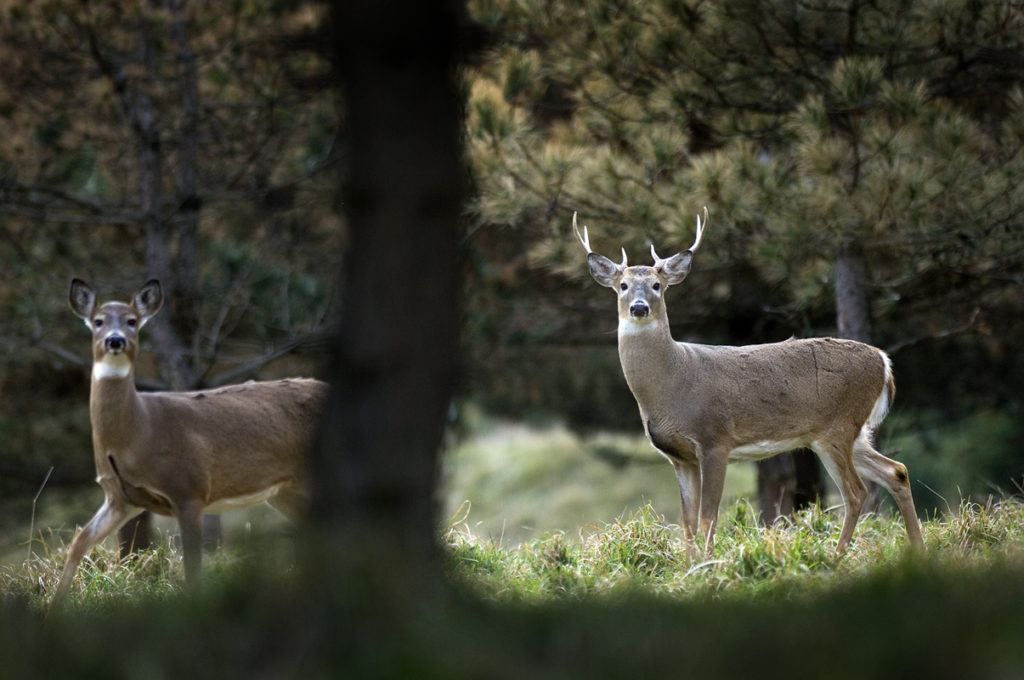
BOW HUNTERS IN CWD ZONE HELPING THE EFFORT

Photo courtesy of the Michigan DNR
Bow season is here, and now that you are prepped and ready to go (and perhaps reading this from the tree stand now), that means that Michigan deer hunters need to also be reminded of the new regulations in place due to Chronic Wasting Disease* (CWD). We’d like to thank the many successful bow hunters that joined in the Opening Day efforts to check your deer so far. If you live or hunt within the CWD Management Zone, which includes Clinton, Shiawassee, and Ingham Counties, and hope to join them, read on!
With (to date) three CWD-positive deer in Meridian township, within 10 miles of these three counties, the Michigan DNR and Department of Agriculture and Rural Development are following the steps outlined in the Michigan Surveillance and Response Plan for Chronic Wasting Disease to try and control the spread from free-ranging deer.
And it seems that, so far, deer hunters are doing a good job of following through on their end, participating in the hunt and harvesting deer! Reports from the Williamstown Township check station on the east end of the CWD Core Area indicate that the station was steadily busy with successful deer hunters throughout the day.
The Core CWD Area consists of nine townships: Lansing, Meridian, Williamstown, Delhi, Alaiedon, and Wheatfield townships in Ingham County, DeWitt and Bath townships in Clinton, and Woodhull Township in Shiawassee County. If you harvest a deer from any of these townships, you must submit the entire carcass within 72 business hours to a DNR check station located within the nine townships. If you’re curious about where the check stations are located you can visit www.michigan.gov/deer for further information. At the check stations they will remove the head and use that for testing purposes. Once the head has been submitted for testing, you may take the carcass to a taxidermist, processor, or your home.
Its important to note that even hunters outside the Core Area can have their deer checked for CWD and you don’t have to bring it to the Core Area for that test, just take it to your nearest local check station, which can be found here.
If CWD is found in a submitted deer the hunter will be notified by phone, and if no tests show positive results they will be posted online at www.mi.gov/dnrlab. Hunters should be notified within one week with the test results.
Along with the mandatory check stations, hunters and residents in the CWD Core Area (DMU 333) and CWD Management Zone will:
- have a deer feeding and baiting ban in place,
- be prohibited from roadside salvage or possession of a road-killed deer.
- be able to buy unlimited Doe tags in Deer Management Unit 333 for only $12.
- be able to take any buck or doe in DMU 333 on a a regular or combination deer tag, regardless of antler points.
If you have further questions or are just curious about Chronic Wasting Disease you can visit www.mi.gov/cwd for more information.
We encourage all deer hunters to harvest deer in the CWD Management Zone so we can better understand the extent of the disease and help to contain it. And every deer hunter outside of the CWD Zone should strive to get their deer to a check station if possible. Good luck, shoot straight, and keep your eyes open for CWD this season!
*Chronic Wasting Disease is essentially a central nervous system disease found in cervids: deer, elk, and moose. The disease attacks the brain of infected animals creating small lesions which ultimately leads to death. Animals that have the disease generally carry the following symptoms: loss of body condition or emaciation, loss of fear of humans, loss of bodily control or movements, and excessive drooling and salivating.
